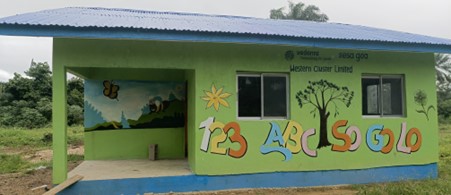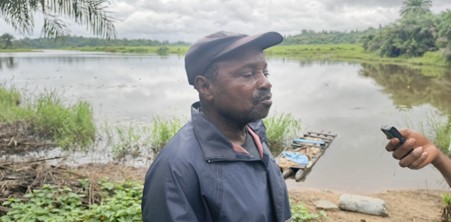SENJEH, Bomi – Citizens of communities in Western Cluster Liberia Limited’s mining communities in Bomi have criticized the company over the impact of water pollution and environmental degradation caused by the company’s operations.
Western Cluster, a US$2.6 billion investment, has been accused of polluting water sources, damaging the land and homes of residents through mine blasts, and doing nothing to revert their negative impacts on their livelihoods.
The company began operations after it signed a 25-year Mineral Development Agreement with the government in 2011.
Edwin Momolu, a local farmer in Zalakai Town, expressed his frustration over the impact of the company’s activities on his crops, including corn, peppers, bitterball, and eddoes.
Momolu said many of their homes are also collapsing, and their water sources are being polluted due to explosions in the mines. Meanwhile, students cannot attend school because the roads used to access their school in Tubmanburg have been closed.
“We are slowly dying here, and if I had power, I would shut down this company,” he said.
“The first Western Cluster arrived here in 2011 and began to do good things, but this second Western Cluster is almost like a problem for us. Our houses are falling apart, we don’t sleep at night, and when they blast, the entire ground can shake, and the chemical smell spreads throughout this place. We used to plant our crops, and they would produce more, but we are not getting anything from them again, so we just decided to plant rice now.”
Local farmer Edwin Momolu of Zalakai Town. Photo: Richard Williams.
Darsalamu is another town in Bomi significantly impacted by Western Cluster’s mining operations. Locals there must travel to a neighboring town to get safe drinking water, as chemicals spread by the mining have contaminated their water sources.
A resident of the town, Thomas James, said the company has refused to build them hand pumps to provide an alternative to safe drinking water.
Like Zalakah and other towns, Darsalamu residents are also experiencing cracks in their homes, while dust from mine blasting often causes headaches for locals.
“We are not using the creek water again, and since there is no hand pump here – we typically walk to get water from Bola Town,” said Thomas James, a resident of Darsalamu.
“What’s really affecting us here is that blasting. Just see our houses – they are all cracking. Some of us are experiencing headaches because when they blast, the dust can take over this entire place.”

The bottom of the blue lake. Water from the polluted lake goes into the smaller streams. Photo: Richard Williams.
Western Cluster’s community relations manager, Victor Johnson, said the company understands its corporate social responsibilities and knows that mining causes environmental pollution. He revealed that Vedanta’s Head of Corporate Responsibility is currently conducting an assessment to determine the problems that the mining process is causing for the surrounding communities. Vedanta is the parent company of Western Cluster.
At the same time, he said the company has begun constructing and renovating a few handpumps in three nearby areas, while there are also plans to reach out to other communities.
“This is not a new conversation about the effects on the environment,” Johnson said. “However, at the moment, we are building a hand pump in Borbor Town and renovating another one. We also extended this to Zalakai Town and rebuilt a hand pump there to stop residents from using the creek water, and we have plans to reach out to the other communities.”
He acknowledged the concerns of affected communities but stressed the need for the government to review its agreement to address the problems.
He revealed that the company recently constructed a one-classroom pre-primary school building to provide learning opportunities to Zalakai and Borbor Towns kids too young to travel to Tubmanburg for school.
“As we speak, the road from Borbor Town to Zalakai has been rehabilitated to give easy access to the citizens after we told them not to use the previous route because of the risk involved with passing right near the mine to get to Tubmanburg,” he said.
Despite Bomi’s Superintendent Haja Washington’s condemnation of the school structure for its small size, Johnson wants the Ministry of Education to go ahead and manage the structure for now, as it is already completed.

The pre-primary school constructed by Western Cluster Limited in Zalakai Town. Photo by Richard Williams.
Meanwhile, Bomi’s coordinator of the Environmental Protection Agency, Ben Wellington, announced that the agency would initiate an impartial evaluation of the company’s impact on the environment and the lives of community members.
“We don’t run the EPA through speculations,” he said. “An impact assessment was done before these people started, and that report is currently in the Monrovia database. Therefore, if there is any information about the environmental impact of the mining process, we will need to conduct an independent survey to determine whether this is seriously endangering the people.”
Bomi’s county development officer, Alfred Zinnah, also expressed concern over the alleged environmental impacts on the local population. He advised that residents of the affected communities be relocated.
Zinnah said it was unacceptable for a US$2.6 billion investment to allow people impacted by its activities to live in appalling conditions with conditions threatening their health.
While the investment is a welcoming development for the county, he cautioned that extracting the iron ore must not be to the detriment of the ordinary people.
He reassured citizens seriously impacted by the mining that the administration was working on their relocation.
“The company must acknowledge that the people are being impacted by their mining process and take all necessary steps to relocate them,” he said. “Let our people just be calm; we are speaking with the company closely to take the necessary action.”
Featured photo by Richard Williams


